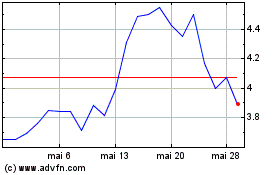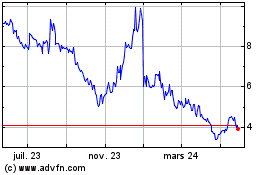Anavex Life Sciences Corp. (“Anavex” or the “Company”) (Nasdaq:
AVXL), a clinical-stage biopharmaceutical company focused on
developing innovative treatments for Alzheimer's disease,
Parkinson's disease, schizophrenia, neurodevelopmental,
neurodegenerative, and rare diseases, including Rett syndrome, and
other central nervous system (CNS) disorders, today announced that
the European Medicines Agency (EMA) has accepted for review the
Marketing Authorization Application (MAA) for blarcamesine
(ANAVEX®2-73), an investigational drug for the treatment of
Alzheimer’s disease. The Company is looking forward to working with
the EMA.
Blarcamesine is an orally once daily
administered small molecule for the potential treatment of patients
with Alzheimer’s disease.
“The EMA filing acceptance for blarcamesine to
review the Marketing Authorization Application potentially brings
us a step closer offering broader patient access to a new treatment
option in Europe, and we look forward to continued engagement with
the EMA,” said Juan Carlos Lopez-Talavera, MD, PhD, Head of
Research and Development of Anavex. “Through our clinical
development program, we have seen that blarcamesine has the
potential to slow the progression of this relentless and ultimately
fatal disease.”
The MAA is supported by data from the
randomized, double-blind, placebo-controlled Phase IIb/III,
ANAVEX®2-73-AD-004 trial and it’s up to 144 week
open-label-extension (OLE) ATTENTION-AD ANAVEX®2-73-AD-EP-004 trial
investigating blarcamesine in early Alzheimer’s disease. Former
study was recently accepted in a peer-reviewed medical journal with
focus on Alzheimer’s disease titled, “Blarcamesine for the
treatment of Early Alzheimer’s Disease: Results from the
ANAVEX2-73-AD-004 Phase IIB/III trial.”
Strengthening the submission is the 265 week
(~5-year) Phase 2a trial investigating blarcamesine in
mild-to-moderate Alzheimer’s disease, with interim preliminary data
published in the peer-reviewed medical journal, Alzheimer’s &
Dementia, titled: “A precision medicine framework using artificial
intelligence for the identification and confirmation of genomic
biomarkers of response to an Alzheimer's disease therapy: Analysis
of the blarcamesine (ANAVEX2-73) Phase 2a clinical study.”
“We look forward to working with the EMA and
thank the team at Anavex for their work on the submission,” said
Christopher U. Missling, PhD, President and Chief Executive Officer
of Anavex. “We are committed to improving patient access to novel
and accessible oral medicines.”
Data from the Phase IIb/III trial demonstrated
oral once daily blarcamesine pre-specified clinical efficacy
through upstream SIGMAR1 activation. SIGMAR1 is an integral
membrane protein which activates an upstream compensatory process:
Blarcamesine induces autophagy through SIGMAR1 activation resulting
in restoring cellular homeostasis.
Impaired autophagy precedes both amyloid beta
and tau tangles, and therefore anticipates the neurodegenerative
process in Alzheimer’s disease.1 Hence, stabilization or
restoration of autophagy can be seen as an early preventative
measure countering the Alzheimer’s disease pathology.
Blarcamesine, a small molecule administered
orally once daily, demonstrated clinically meaningful improvement
over 48 weeks with primary endpoint ADAS-Cog13 score being larger
than 2 points.2 This suggests superior numerical clinical efficacy
compared to approved therapies while also slowing neurodegeneration
in early AD patients. Blarcamesine’s safety profile indicates not
requiring routine MRI monitoring, and given its differentiated
mechanism of action, oral blarcamesine could represent a novel
treatment that could be complementary or an alternative to
injectable anti-beta amyloid monoclonal antibody drugs.
This release discusses investigational uses of
an agent in development and is not intended to convey conclusions
about efficacy or safety. There is no guarantee that any
investigational uses of such product will successfully complete
clinical development or gain health authority approval.
About Alzheimer’s Disease
There are an estimated 7 million people in
Europe with Alzheimer’s disease, a number expected to double by
2030, according to the European Brain Council.3 The World Health
Organization (WHO) estimated the cost in Europe of caring for
people with dementia, including Alzheimer's disease, at $439
billion, or $31,144 per person in 2019. That includes hospital
care, medicines, diagnostics, informal caregiver time, community
services and long-term care facility costs.4,5
About Anavex Life Sciences Corp.
Anavex Life Sciences Corp. (Nasdaq: AVXL) is a
publicly traded biopharmaceutical company dedicated to the
development of novel therapeutics for the treatment of
neurodegenerative, neurodevelopmental, and neuropsychiatric
disorders, including Alzheimer's disease, Parkinson's disease,
schizophrenia, Rett syndrome, and other central nervous system
(CNS) diseases, pain, and various types of cancer. Anavex's lead
drug candidate, ANAVEX®2-73 (blarcamesine), has successfully
completed a Phase 2a and a Phase 2b/3 clinical trial for
Alzheimer's disease, a Phase 2 proof-of-concept study in
Parkinson's disease dementia, and both a Phase 2 and a Phase 3
study in adult patients and one Phase 2/3 study in pediatric
patients with Rett syndrome. ANAVEX®2-73 is an orally available
drug candidate designed to restore cellular homeostasis by
targeting SIGMAR1 and muscarinic receptors. Preclinical studies
demonstrated its potential to halt and/or reverse the course of
Alzheimer's disease. ANAVEX®2-73 also exhibited anticonvulsant,
anti-amnesic, neuroprotective, and anti-depressant properties in
animal models, indicating its potential to treat additional CNS
disorders, including epilepsy. The Michael J. Fox Foundation for
Parkinson's Research previously awarded Anavex a research grant,
which fully funded a preclinical study to develop ANAVEX®2-73 for
the treatment of Parkinson's disease. We believe that ANAVEX®3-71,
which targets SIGMAR1 and M1 muscarinic receptors, is a promising
clinical stage drug candidate demonstrating disease-modifying
activity against the major hallmarks of Alzheimer's disease in
transgenic (3xTg-AD) mice, including cognitive deficits, amyloid,
and tau pathologies. In preclinical trials, ANAVEX®3-71 has shown
beneficial effects on mitochondrial dysfunction and
neuroinflammation. Further information is available at
www.anavex.com. You can also connect with the Company on Twitter,
Facebook, Instagram, and LinkedIn.
Forward-Looking Statements
Statements in this press release that are not
strictly historical in nature are forward-looking statements. These
statements are only predictions based on current information and
expectations and involve a number of risks and uncertainties.
Actual events or results may differ materially from those projected
in any of such statements due to various factors, including the
risks set forth in the Company’s most recent Annual Report on Form
10-K filed with the SEC. Readers are cautioned not to place undue
reliance on these forward-looking statements, which speak only as
of the date hereof. All forward-looking statements are qualified in
their entirety by this cautionary statement and Anavex Life
Sciences Corp. undertakes no obligation to revise or update this
press release to reflect events or circumstances after the date
hereof.
For Further Information:Anavex
Life Sciences Corp.Research & Business DevelopmentToll-free:
1-844-689-3939Email: info@anavex.com
Investors:Andrew J.
BarwickiInvestor Relations
Tel: 516-662-9461Email: andrew@barwicki.com
1 Christ MG, Clement AM, Behl C. The Sigma-1 Receptor at the
Crossroad of Proteostasis, Neurodegeneration, and Autophagy. Trends
Neurosci. 2020 Feb;43(2):79-81; Chen, J., He, HJ., Ye, Q. et al.
Defective Autophagy and Mitophagy in Alzheimer’s Disease:
Mechanisms and Translational Implications. Mol Neurobiol 58,
5289–5302 (2021).2 Muir RT, Hill MD, Black SE, Smith EE. Minimal
clinically important difference in Alzheimer's disease: Rapid
review. Alzheimers Dement. 2024;20(5):3352-3363.
doi:10.1002/alz.137703
https://www.braincouncil.eu/projects/rethinking-alzheimers-disease/4
Jönsson L. The personal economic burden of dementia in Europe.
Lancet Reg Health Eur. 2022 Jul 25;20:100472. doi:
10.1016/j.lanepe.2022.100472. PMID: 35910037; PMCID: PMC9326307.5
World Health Organization (WHO); 2021. Global status report on the
public health response to dementia.
Anavex Life Sciences (NASDAQ:AVXL)
Graphique Historique de l'Action
De Déc 2024 à Jan 2025

Anavex Life Sciences (NASDAQ:AVXL)
Graphique Historique de l'Action
De Jan 2024 à Jan 2025
